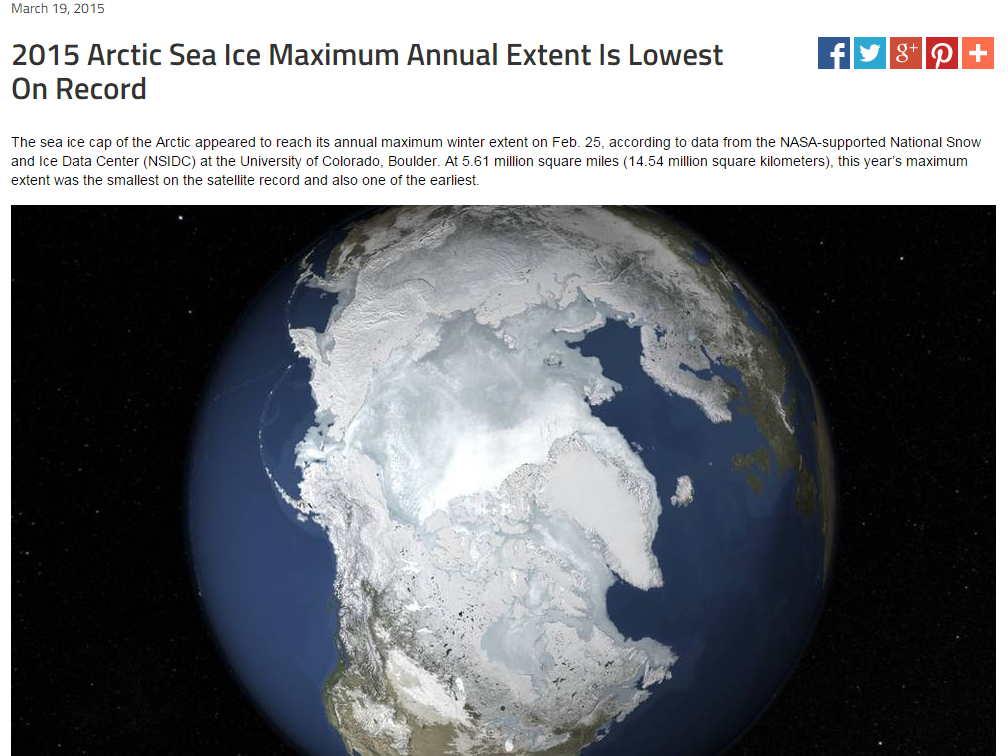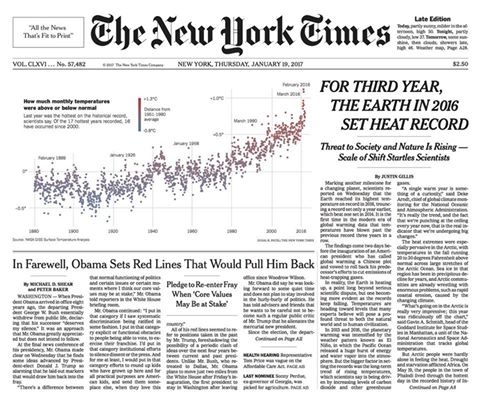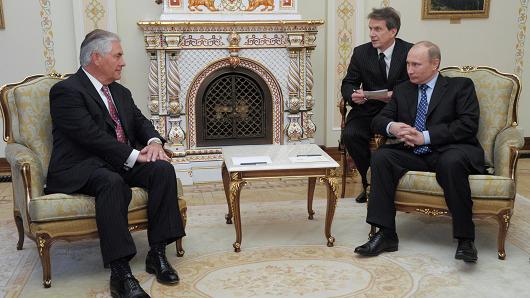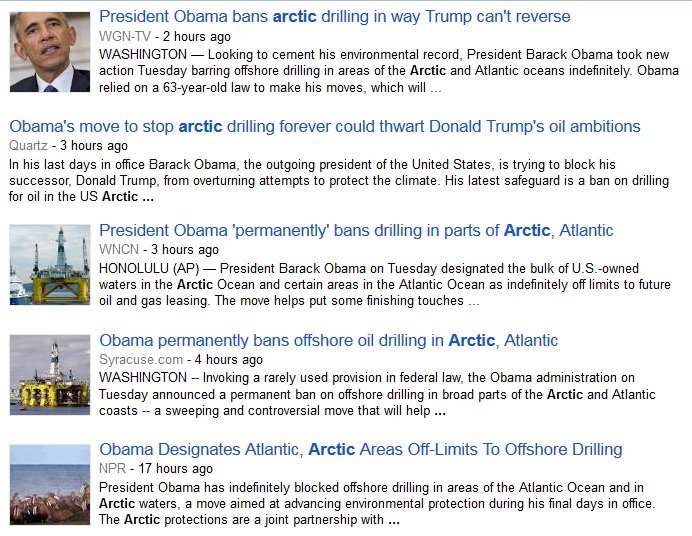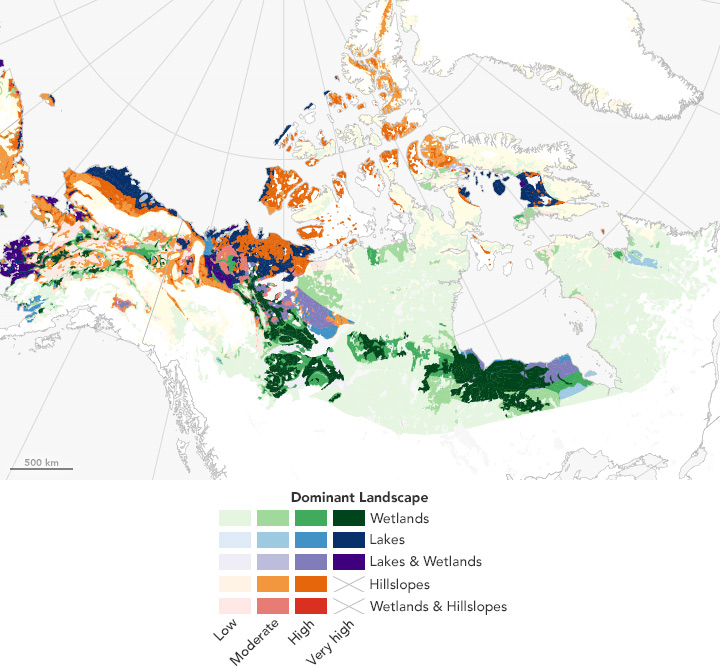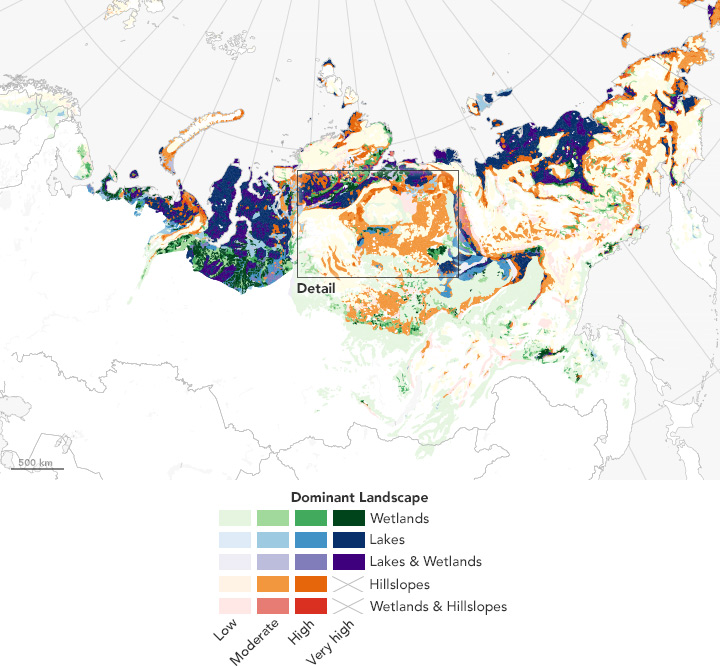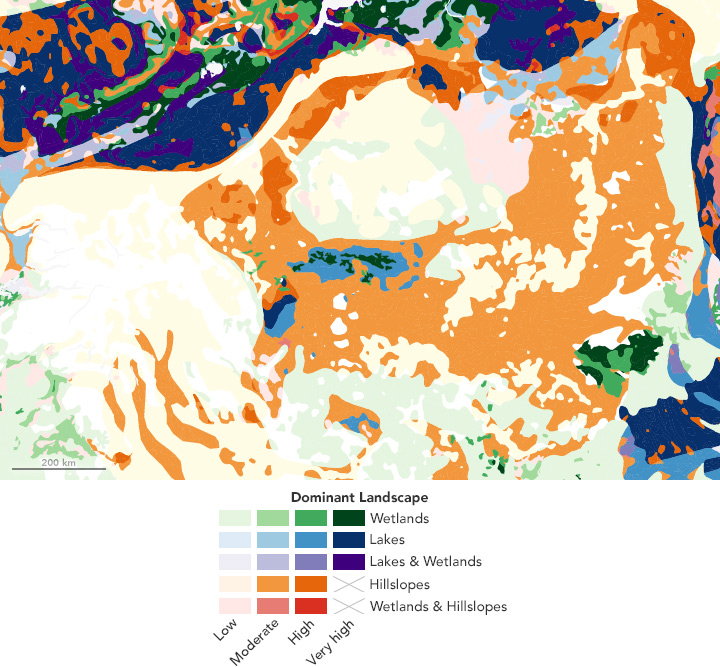Oil-Gas Resources and Drilling in the Arctic: Difference between revisions
Siterunner (talk | contribs) No edit summary |
Siterunner (talk | contribs) No edit summary |
||
| Line 9: | Line 9: | ||
'''Q3 / 2017''' | '''Q3 / 2017''' | ||
● [http://www.cnn.com/2017/08/02/politics/donald-trump-russia-sanctions-bill/index.html '''Trump Reluctantly Signs Sanctions Bill'''], '''Joint US/Russia Arctic Gas/Oil Ventures Blocked''' | |||
● [https://www.washingtonpost.com/news/energy-environment/wp/2017/06/29/trump-says-the-atlantic-arctic-could-soon-be-open-to-oil-drilling/ '''Trump: Time to Open the Arctic to Drilling'''] | ● [https://www.washingtonpost.com/news/energy-environment/wp/2017/06/29/trump-says-the-atlantic-arctic-could-soon-be-open-to-oil-drilling/ '''Trump: Time to Open the Arctic to Drilling'''] | ||
Revision as of 01:36, 6 August 2017
Heatwaves are melting the Arctic
Time to Drill -- or Delay as US/Russia Gas/Oil Agreements Collapse
Q3 / 2017
● Trump Reluctantly Signs Sanctions Bill, Joint US/Russia Arctic Gas/Oil Ventures Blocked
● Trump: Time to Open the Arctic to Drilling
● US Senate Passes Russia Sanctions Deal
- In effect, action by the US Congress to continue/extend sanctions has the effect of blocking ExxonMobile-Rosneft Arctic drilling
- Exxon and Rosneft offshore exploration partnership plans to invest as much as $500 billion in developing Russia's vast energy reserves in the Arctic and Black seas
● Budget calls for opening of the Arctic National Wildlife Refuge to oil and gas drilling
● Trump Moves to Remove Russia Sanctions, Enabling Joint US/Russia Arctic Drilling
May 2017
Geopolitical Friction over Oil/Gas Resources Adds New Risks to Volatile Change
https://www.greenpolicy360.net/mw/images/Arctic-swipa-spm.pdf
April 2017
● Exxon and Rosneft Arctic Drilling Agreement, Russian Sanctions, On or Off?
● Arctic Ocean Is Becoming More Like the Atlantic Ocean
● Pushed by Currents, Billions of Pieces of Plastic Pollution from World's Oceans End Up in the Arctic
● New Expanded Arctic Drilling Policies Are in the Works
March 2017
On a tour on the Franz Josef Land archipelago, a sprawling collection of islands where the Russian military has recently built a new runway and worked to open a permanent base, Putin emphasised on Wednesday (March 29) the need to protect Russia's economic and security interests in the Arctic.
"Natural resources, which are of paramount importance for the Russian economy, are concentrated in this region," Putin said in remarks carried by Russian news agencies.
Putin said current estimates put the value of the Arctic's mineral riches at $30 trillion.
NASA's Earth Science News Team / Arctic sea ice appears to have reached on March 7 a record low wintertime maximum extent, according to scientists at NASA and the NASA-supported National Snow and Ice Data Center (NSIDC) in Boulder, Colorado. And on the opposite side of the planet, on March 3 sea ice around Antarctica hit its lowest extent ever recorded by satellites at the end of summer in the Southern Hemisphere...
○
February 11, 2017 via CS Monitor — Records are shattering left and right across the Arctic, much like the ever-dwindling sea ice that once covered the entire Arctic Ocean.
First, the facts. January sea ice area has never been so small. In November, the coverage fell short of average by an area the size of the eastern half of the United States. Northeast Greenland had its warmest February day ever (by almost four degrees). The current heat wave brought temperatures near the North Pole to 50 degrees above average...
“We’re still trying to figure out what is happening here,” Mark Serreze, a senior research scientist with the Colorado-based Snow and Ice Data Center that compiles and reports the history of Arctic ice conditions.
“The ridiculously warm temperatures in the Arctic during October and November this year are off the charts over our 68 years of measurements,” Jennifer Francis, a climate scientist at Rutgers University...
Everyone agrees that "something is very, very wrong with the Arctic climate"...
“[A]fter studying the Arctic and its climate for three and a half decades, I have concluded that what has happened over the last year goes beyond even the extreme,” wrote Mark Serreze, director of the National Snow and Ice Data Center in Boulder, Colo., in an "Crazy times in the Arctic" article for Earth magazine.
The number of freezing degree days is far lower than any other period on record.
https://pbs.twimg.com/media/C4Lj3gcWIAE6dqF.jpg
Between 1980 and 2016 the amount of summer ice in cubic kilometers has decreased by an estimated 72 percent...
- January 19, 2017
Northern Routes Open as Ice Retreats
Exxon Mobil could tap huge Arctic assets if US - Russian relations thaw
- Former Exxon CEO and new US Sec of State Rex Tillerson meets with Russian President Putin
- during 2012 negotiations to move forward with joint oil/gas ventures described as historic
○ ○ ○ ○ ○ ○ ○ ○ ○
February 2017
Ex-Chief of ExxonMobil Testifies Before US Congress
- President-elect Donald Trump's nominee for Secretary of State, Rex Tillerson, said he believes the risks of climate change "could be serious enough that action should be taken,” but he did not elaborate on what that action should be.
Tillerson testified that he formed his views “over about 20 years as an engineer and a scientist, understanding the evolution of the science.” Ultimately, he said, he concluded that increasing greenhouse-gas concentrations in the atmosphere are having an effect on the earth’s climate. But he added, “Our ability to predict that effect is very limited,” and precisely what actions nations should take “seems to be the largest area of debate existing in the public discourse.”
○
December 2016
Geopolitics in the Arctic
- Russia and the United States are moving with force to claim fossil fuel exploration and production rights
- Canada, China, Norway and additional countries are look to join into the Arctic resource exploration
- A 'gas/oil' resource rush is imminent despite inherent dangers and impacts on global climate
- The critical, strategic demand continues for New Definitions of National and Global Security
- A preliminary assessment by the US Geological Survey suggests the Arctic seabed may hold as much as 25 percent of the world's undiscovered oil and natural gas reserves.
- By one USGS reported estimate, 400 billion barrels of oil might lie beneath the Arctic seabed.
A Final Presidential Decision Re: Arctic Oil/Gas
December 19, 2016 / President Barack Obama prepares to leave office and prepares to block the sale of new offshore drilling rights in most of the U.S. Arctic and parts of the Atlantic. The executive order that could indefinitely restrict oil production there, according to people familiar with the decision.
http://www.foxnews.com/politics/2016/11/18/obama-blocks-new-oil-gas-drilling-in-arctic-ocean.html
Arctic Sea Ice at Record Lows / December 2016
http://phys.org/news/2016-12-state-arcticlonger-seasons-thinning-sea.html
https://insideclimatenews.org/news/13122016/arctic-melting-climate-change-noaa-science
http://earthobservatory.nasa.gov/IOTD/view.php?id=89223
http://www.arctic.noaa.gov/Report-Card
- Not Good News, Arctic Sea Ice News
- http://container-news.com/arctic-ocean-shipping-routes-open-months/
Shipping industry report:
Sea-ice is in a committed, long-term decline as the polar north warms.
This year looks on course to be the second lowest in the satellite record. Researchers do not see this trend being reversed anytime soon.
“If we experience a 2-degree increase in global temperatures, we will get close to an Arctic that is effectively ice-free for part of the year; that’s less than a million sq km of ice cover,” said Reading University's Dr. Ed Hawkins.
“So, even if future emissions are consistent with the Paris agreement, it will of course mean shipping routes will be more open. Not every year, but more regularly than they are now.”
“Open water vessels won’t be hugging the Russian coast quite so much, and ice-strengthened ships will be going right over the pole,” he told BBC News.
Saving time
The incentives are clear: if vessels can transit the Arctic, they will shave many days off their journey times between the Pacific and North Atlantic ports, and save fuel.
In addition, by plotting a more central course, they can avoid the fees they would otherwise be charged for going through Siberian waters.
The team has been looking at how the opportunities might evolve in the decades ahead.
The group used five prominent climate computer models and essentially trained them to better reflect the distribution of Arctic sea-ice as seen in current observations.
They then ran those models forward through the century under different emissions scenarios, to gauge where and how frequently shipping routes would become navigable.
https://en.wikipedia.org/wiki/Northern_Sea_Route (Russia)
https://en.wikipedia.org/wiki/Northwest_Passage (Canada)
2015
- http://www.reuters.com/article/us-sanctions-russia-arctic-shipping-idUSKBN0KV17520150122
2014/2013
- http://www.reuters.com/article/us-climate-arctic-shipping-idUSBRE92718420130308
2012/2011
- http://www.reuters.com/article/us-exxon-rosneft-idUSBRE83H0UE20120418
Oil major ExxonMobil (XOM.N) and Russia's Rosneft ROSN.M unveiled an offshore exploration partnership on Wednesday that could invest upward of $500 billion in developing Russia's vast energy reserves in the Arctic and Black Sea.
The deal, between the world's largest listed oil firm and the world's top oil producing nation, was the product of nearly a year of talks and came about despite a history of mutual distrust between Washington and Moscow dating back to the Cold War and recent difficulties for other Western firms in Russia.
"Experts say that this project, in terms of its ambitions, exceeds sending man into outer space or flying to the moon," Russian Deputy Prime Minister Igor Sechin, a key architect of the partnership, told a briefing for analysts in New York.
Under the deal, signed in Moscow on Monday, Exxon and state-controlled Rosneft will seek to develop three fields in the Arctic with recoverable hydrocarbon reserves estimated at 85 billion barrels in oil-equivalent terms.
A final investment decision on the projects in the Kara Sea, in the centre of Russia's north coast, is expected in 2016-17, Rosneft said in a video presentation at the event, which was hosted by Exxon CEO Rex Tillerson and Rosneft President Eduard Khudainatov.
- https://www.theguardian.com/world/2011/jul/06/us-russia-political-tensions-arctic
- https://www.theguardian.com/environment/2011/oct/05/melting-arctic-ice-supertankers
Read More:
● https://www.greenpolicy360.net/w/Category:Arctic
Arctic News -- http://www.arcticnow.com/section/arctic-news/
○
Geo-political Issues (@GreenPolicy's associated site, Strategic Demands)
·
Read More at Strategic Demands
http://strategicdemands.com/new-definitions-of-security/
http://strategicdemands.com/?s=eurasia
·
- Anthropocene
- Arctic
- Atmospheric Science
- Climate Change
- Climate Policy
- Earth Observations
- Earth360
- Earth Science
- Earth Science from Space
- Eco-nomics
- Energy
- Environmental Laws
- Environmental Protection
- Environmental Security
- Environmental Security, National Security
- Fossil Fuels
- Global Security
- Global Warming
- INDC
- NASA
- Natural Resources
- Ocean Science
- Planet Citizen
- Renewable Energy
- Resilience
- Sea-level Rise
- Sea-Level Rise & Mitigation
- Solar Energy
- Strategic Demands
- Sustainability Policies
- US Environmental Protection Agency
- Whole Earth
